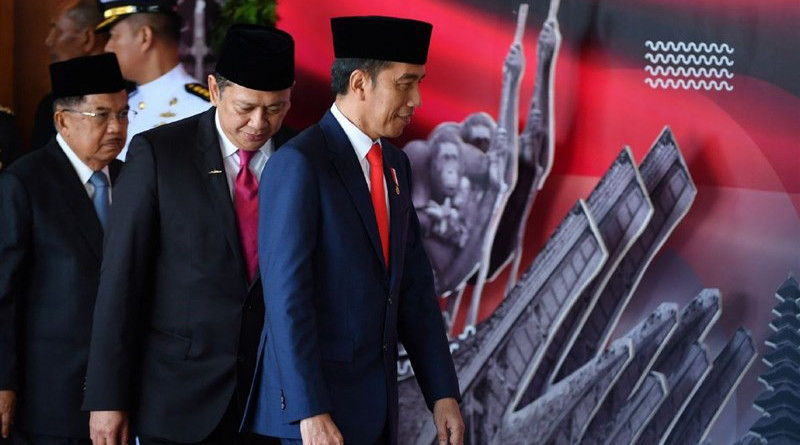Pancasila Guidance Bill: Tweaking Indonesia’s Ideology? – Analysis
By RSIS
The Bill on Pancasila Ideological Guidance now before parliament reflects the long-standing divisions in Indonesian society. Is there a need to rethink the national ideology?
By Alexander R Arifianto and Jefferson Ng*
A draft law on Pancasila Ideological Guidance (RUU Haluan Ideologi Pancasila, HIP) was recently proposed by the Indonesian parliament. While the stated intent is to strengthen national unity, questions are being asked whether, on the contrary, old divisions are being resurrected. Pancasila refers to the Five Principles enshrined in the Preamble of the 1945 Constitution of the Republic of Indonesia, namely Belief in God, Humanitarianism, the Unity of Indonesia, Democracy, and Social Justice.
These Five Principles are the founding tenets of the state (dasar negara), a product of a historical compromise to resolve differences among Indonesia’s major groupings, particularly between Islamic groups and secular nationalists. Introduced by the dominant Indonesian Democratic Party Struggle (PDIP), the bill is an attempt to reaffirm the founding tenets of the Indonesian state to support national unity, following the divisive 2019 general election that had split Indonesians along distinct political and sectarian lines.
Why the Bill
The bill is an indication of growing nervousness among sections of the Indonesian political elite about the increasing rightward shift of Indonesian society on the back of what they see as declining religious tolerance.
After Reformasi, regional decentralisation has led to the fragmentation of Indonesia’s national education curriculum, which has enabled numerous schools to de-emphasise instructions on Pancasila in favour of instructions on religious content. The central government has begun to wrestle back control by reintroducing instructions on Pancasila education, through the new Agency for Pancasila Ideology Education.
Nadiem Makarim, the minister for education, has also spoken publicly about prioritising “character education”, especially with regards to building tolerance and respect between people of different ethnicities and religious groups.
The new bill provides for Pancasila ideology as a teaching subject from primary school to university level, and for places of worship and religious institutions to promote tolerance and cooperation between religions in the spirit of mutual help (gotong royong).
Out of Touch?
The bill also seeks to promote concrete developmental goals, such as to strengthen the role of scientific principles in education, guarantee the right of every citizen to employment, and organise a national industrial system that is independent and competitive. Additionally, it acts as an umbrella law to serve as guidelines for national education, science and technology, population and family, politics and security and fostering Pancasila ideology.
It remains unclear how these guidelines will be translated into policy implementation, and the draft law seems out of touch with the more immediate needs of the COVID-19 outbreak.
Additionally, many of the provisions are aspirations and lofty goals, referencing a wide range of areas, which appears to be another attempt to resurrect the defunct “Broad Guidelines of State Policy” (Garis Besar Haluan Negara or GBHN) ─ previously stipulated every five years during the Suharto era.
According to legislative minutes of 22 April 2020, the PDIP’s proposal was supported by almost all parties in parliament (except for the Democrat Party) although with numerous concerns placed on record. However, the HIP bill quickly encountered strong opposition from Indonesia’s major Islamic groups.
Opposition to the Bill
Nahdlatul Ulama (NU) and Muhammadiyah, Indonesia’s two largest Islamic organisations, declared their opposition to the bill in its current form. The Indonesian Ulama Council (MUI), the nation’s quasi-state regulatory body for Islamic affairs, has also declared its opposition to the bill.
All three groups objected to controversial provisions in the bill that appear to sideline religion’s role in national and political life and installing a new secularist interpretation based on science and technology.
Hence, the division between proponents and opponents of the HIP bill is a reenactment of the old debate between secular nationalists (represented by PDIP) and Islamic groups (represented by NU, Muhammadiyah, and MUI) on the fundamental principles of the Indonesian state and the proper role of religion in the Indonesian public life.
However, NU and Muhammadiyah do not just rely on Islamic arguments in their objections to the bill. Both pointed out that the bill would elevate the Indonesian president as the sole interpreter and arbiter of the Pancasila, reminiscent of the Suharto regime.
Due to widespread opposition, the Joko Widodo (‘Jokowi’) administration, represented by the Coordinating Minister of Politics, Law, and Security Affairs Mahfud MD, has requested the parliament to postpone the bill. The postponement will be until it has reached a consensus with other social groups.
Implications: Two Persistent Fault Lines
The controversy surrounding the bill underlines two persistent fault lines in Indonesia — the nationalist-religious divide over the founding tenets of the state and the economic nationalist-liberal divide over the management of the economy.
Both fault lines are hot-button issues in today’s context given the growing Islamisation of Indonesian society and the Jokowi administration’s reforms to open up the economy to more foreign investments and relax certain labour protection rules.
However, the reality is that the problems faced by Indonesia today are very complex to be resolved by an ideology that was originally conceived 75 years ago, without any efforts to rethink and renew it within the contexts of a 21st century Indonesian society.
If the parliament wishes to proceed with the deliberation of the bill, then it should invite all societal groups – representing the nationalist, Islamic, and liberal ideological lines, to craft a bill that reflects all viewpoints in society, just like Indonesian founding fathers did in 1945 prior to declaring the country’s independence.
A Pancasila ideology bill that reflects the views of all groups will promote a lasting political compromise and secure Indonesia’s future as a stable and democratic society.
*Alexander R Arifianto is a Research Fellow and Jefferson Ng a Senior Analyst with the Indonesia Programme, S. Rajaratnam School of International Studies (RSIS), Nanyang Technological University (RSIS), Singapore.

